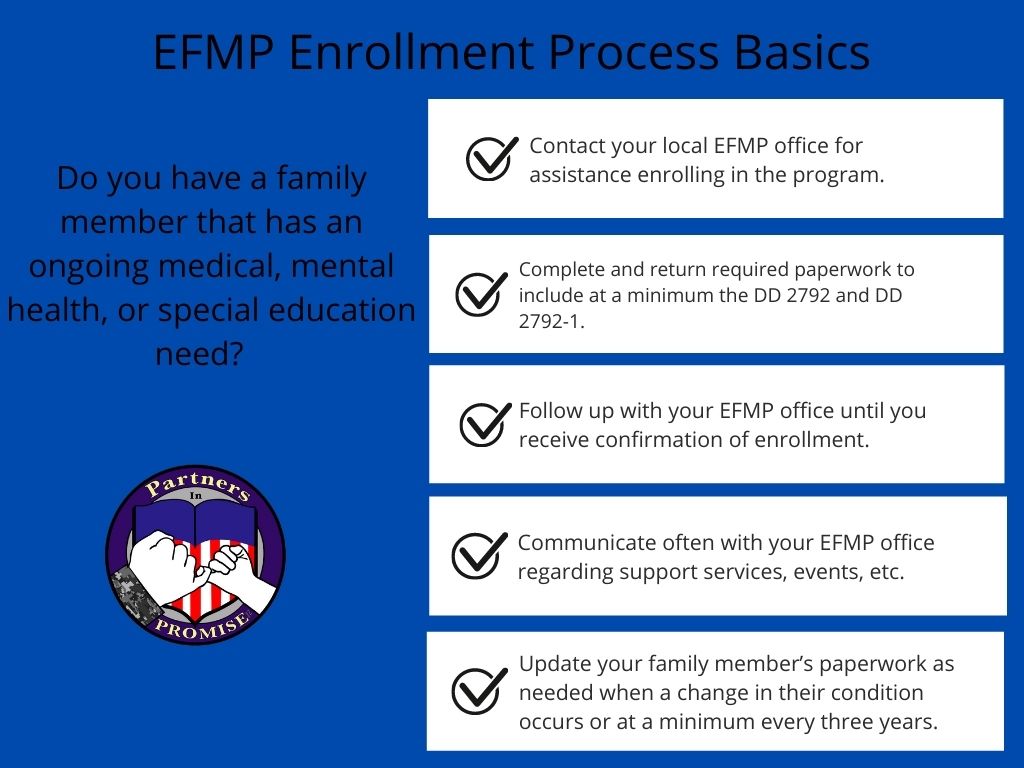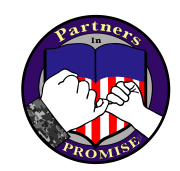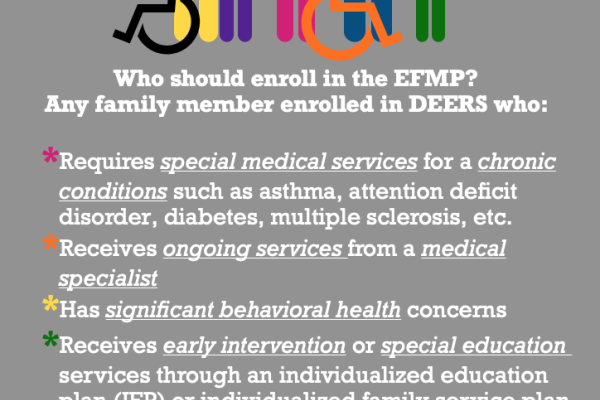When a loved one receives a diagnosis that results in the need for specialized medical or educational services, it is easy to become overwhelmed. After swimming through the sea of emotions caused by processing the diagnosis, beginning the task of enrolling your family member in the Exceptional Family Member Program (EFMP) can make you feel like you are barely treading water. The information below will provide a roadmap to make this process less intimidating. Armed with information and confidence, you will become your family member’s best advocate as your family embarks on this new journey.
First of all, what exactly is the EFMP?
Whether or not you have been around the military for one year or 13, you have probably heard something about the Exceptional Family Member Program. Often times you may hear myths about the program, such as enrolling may hurt your service member’s career options or their ability to promote. Other times, you may hear how they’ve helped a friend secure ABA services for their child with autism. Regardless of what you have heard, I am here to set the record straight; the EFMP is here to ensure that your or your family member’s unique documented special needs are considered during the assignment process. Seems pretty simple, right? But, let’s dig in a little more.
The EFMP will provide your family with three tiers of support: identification and enrollment, assignment coordination, and family support.
We will look at each of these tiers more in-depth below; however, within these tiers, family members can find many benefits including identifying and accessing programs and services, information and referrals for military and community services, assistance navigating medical and educational systems, education and outreach, and non-clinical case management. In addition to these benefits, enrollment in EFMP provides access to Tricare Extended Care Health Option (ECHO); a benefit that provides supplemental services to active duty family members with qualifying mental or physical disabilities.
EFMP is a mandatory enrollment program for active duty service members who have a dependent family member(s) with ongoing medical, mental health, or special educational needs. There are Exceptional Family Member Programs for four of the five military branches. The Coast Guard does not have an EFMP since it is not a Department of Defense branch, however, service members with eligible family members are required to register in the Coast Guard Special Needs Program. Although each Service has its own EFMP, they all serve the same essential function: coordinating the assignment process to ensure that your family is not sent to a location that lacks adequate medical or educational resources.
Who should enroll in the program?

One common misunderstanding is that the EFMP is only for dependent children; this is not the case. The program is designed to support the unique needs of any family regardless of age or qualifying condition.
So how exactly can your family be identified as having a special medical, mental health, or educational need? In some cases, families will self-refer. Self-referral will look something like this: the family is already familiar with the EFMP, one of the family members receives a diagnosis or develops a specialized need, and the active duty member and/or spouse will go to the EFMP office and seek assistance to begin the enrollment process. In other cases, a person’s primary care manager, civilian doctor, or teacher will refer the person to the EFMP. Regardless, of how you or your family member is identified, any family member registered in DEERS with ongoing special medical, mental health or educational needs MUST enroll in the Exceptional Family Member Program.
While enrollment may look a little different depending upon your sponsor’s branch of service, two forms are consistent across branches; the DD 2792 (Medical Information) and DD 2792-1 (Education Information). The good news is, that even though these documents are lengthy, the first few pages provide very detailed instructions of how and what to fill out. These forms have been highlighted yellow for what is your responsibility to fill out and teal for what the professional is required to fill out. For more information about these forms and the specific requirements for your service branch, please see the links at the end of this article.
It is important to realize that enrollment is not permanent and your or your family’s enrollment status can change at any time. It is the service member’s responsibility to keep EFMP enrollment paperwork current. At a minimum, the EFMP paperwork must be updated every three years or as needed. This means, if conditions/needs change, the service member should submit updates to their local EFMP office. If you or your family member no longer have a qualifying condition, you can be unenrolled from the program at any time.
EFMP Enrollment Process

- Have a family member that has an ongoing medical, mental health, or special education need.
- Contact your local EFMP office for assistance enrolling in the program.
- Complete and return required paperwork to include at a minimum the DD 2792 and DD 2792-1.
- Follow up with your EFMP office until you receive confirmation of enrollment.
- Communicate often with your EFMP office regarding support services, events, etc.
- Update your family member’s paperwork as needed when a change in their condition occurs or at a minimum every three years.
Assignment Coordination
Enrollment in the EFMP ensures you or your family member’s documented special needs are considered during the assignment process. The primary role of the EFMP is to prevent your family from being sent to locations without adequate medical or educational services. For example, you wouldn’t want to be living on mainland Japan, as a person with diabetes without access to insulin or be stationed in a location that does not have a specialized program for your child with autism. As part of the assignment coordination process, personnel officials consult with medical and educational professionals at the proposed location to determine if your family’s needs can be met there or at an approved location within a specified radius.*
It is important to keep in mind that mission readiness is the priority and some service members may receive unaccompanied orders to meet both the need of the service branch and his/her family.
*If you find that you have been sent to a location that doesn’t offer required services please contact Partners in PROMISE.
Family Support
EFMP family support plays a critical role in increasing family readiness and helping your family become an educated advocate. In doing so, you will be able to navigate the identification, enrollment and assignment coordination processes with confidence and ease.
Available supports and services will vary among the branches and even from installation to installation within the same branch. In some locations, EFMPs offer support groups, workshops, resource and referral, play groups, family events, and much more! The EFMP office can also connect you with local and base resources to support your family’s unique needs.
Additionally, if you are eligible, your family case worker can provide enrollment assistance for programs such as Tricare ECHO or the EFMP respite care reimbursement program.
If there is a resource, program, or assistance that would be beneficial to you or your family member and your local EFMP is not providing it, ask! You are your own best advocate! Follow the program’s chain of command, submit an Interactive Customer Evaluation (ICE) which will be read by installation leadership, or reach out to organizations like Partners in PROMISE.
The Biggest Takeaway
It is my hope that after reading this, you feel empowered and educated to advocate for your family or help someone you know that may be looking for some help staying afloat as they navigate new and uncharted waters. That is the beauty of this crazy military life we are all a part of, you never have to tackle anything alone!
Learn the LINGO
- DD 2792 : Family Member Medical Summary This form is used to document your family member’s special medical needs. This information assists military assignment personnel in matching your family member’s special medical needs against the availability of medical services at the projected duty station.
- DD 2792-1:This form is used to document the special education needs of a child with a disability, birth through age 21. This information will assist military assignment personnel in matching the child’s special education needs against the availability of educational services at the projected duty station.
- DEERS: Defense Enrollment Eligibility Reporting Service- DEERS is a computerized database of military sponsors, families and others worldwide who are entitled for TRICARE and other benefits.
- EDIS: Educational and Developmental Intervention Services
- EFMP: Exceptional Family Member Program
- FCP: Family Care Plan – A Family Care Plan is an essential part of military readiness. It is a means for the service member to plan in advance for the care of his/her family members when he/she is deployed, TDY, or otherwise not available because of military duty.
- IEP: Individual Education Plan
- IFSP: Individual Family Service Plan
- MTF: Military Treatment Facility
- PCM: Primary Care Manager
- Tricare ECHO: Tricare Extended Care Health Option: This benefit provides supplemental services to active duty family members with qualifying mental or physical disabilities. ECHO offers integrated services and supplies beyond those offered by the basic TRICARE health benefits program.
Branch Specific EFMP Resources
- Air Force Exceptional Family Member Program
- Marine Corps Exceptional Family Member Program
- Navy Exceptional Family Member Program
- Army Exceptional Family Member Program
- United States Coast Guard Office of Special Needs
Additional Resources
There are many resources available to families covering a wide range of services:
- Department of Defense Instruction 1315.19 The Exceptional Family Member Program
- EFMP Brochure
- EFMP for All Ages Fact Sheet: describes what the program is, who it is for, how to enroll in it and how enrollment is mandatory for military families with members who have identified special medical or educational needs.
- EFMP & Me is an online resource designed to help you effectively navigate through the Department of Defense’s network of services and support for families with special needs.
- EFMP Resources, Options, & Consultations – EFMP ROC is enhanced support for military families with special needs. Special needs consultants are available by phone or video to help you navigate the medical and educational needs of your family, and connect you with military and community-based support.
- EFMP Quick Reference Guide
- EFMP Video Series provides twenty-one videos to empower family members with special needs to get the most from the EFMP. The modules outline key information needed to secure the right care, from identifying eligibility for early-intervention services and organizing medical and school records to establishing a relationship with a teacher and smart strategies to meet all of your family’s needs when moving.
- Free, military department-provided legal support is available for military families with special needs.
- Navy EFMP App The Navy EFMP App provides Navy families, doctors, service providers, detailers, and program administrators up-to-date information and resources all in one place. Visit the Navy App Locker to download the app.
- Operation Autism is the Organization for Autism Research initiative for military families that have children with autism.
- Partners in PROMISE is an organization that strives to protect the rights of military children in special education through educating and advising the legislative agendas of military service organizations, Department of Defense and public officials.
- Special Care Organizational Record for Children with Special Health or Educational Needs is specifically designed as an organizing tool for parents with children with special health care needs. It is intended to help track and organize your child’s information to make it easier for someone to care for your child in your absence.
- Special Needs Parent Toolkit, is a comprehensive guide for parents on navigating medical and special education services, community support and benefits and entitlements.






Leave a Reply